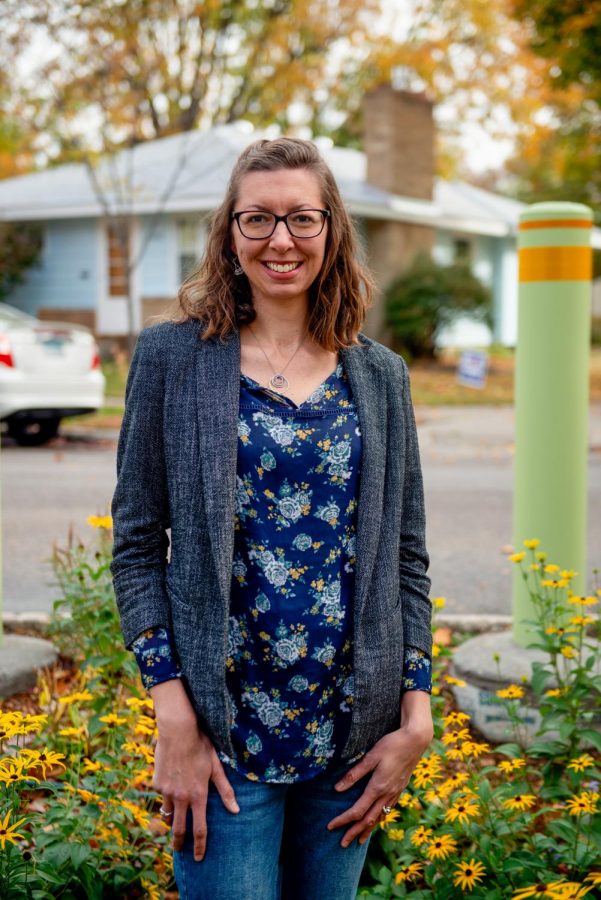Amid the COVID-19 pandemic, social unrest and a divisive election season, the Southeast Como Improvement Association (SECIA) has chosen a new executive director, who her colleagues call “a lawyer with the heart of an organizer.”
Jessica Focht-Perlberg, a Minnesota-born attorney, social worker and community organizer, has a long history of community advocacy and activism around her home state. She graduated with a degree in social work, legal services and psychology from the University of Wisconsin-Madison and later received a graduate degree in social work. Focht-Perlberg then returned to her home state to attend law school at Hamline University.
SECIA president, Karl Smith, said he knew long before she applied for the job that she was the perfect fit.
“She has a very strong background and a deep commitment to the organization,” he said.
Focht-Perlberg was selected from four candidates for the position. She left her mark on several communities in multiple states with her relational approach to community work.
Relational organizing, according to Focht-Perlberg, is all about finding common ground before you get to work.
“Having that base of relationships that can feed these ideas, that’s more sustaining,” Focht-Perlberg said. “As you build a base of relationships across communities together on a number of different issues, you have that kind of sustaining, relational base from which to work from.”
Following college, her journey began in Madison, Wisconsin, where she helped establish a chapter of the faith-based community organization Industrial Areas Foundation (IAF), founded in 1940 by activist Saul Alinsky.
Focht-Perlberg continued on what she called a “windy path,” and after leaving IAF, she went on to work with families struggling with significant disabilities and accessibility to education, health care and other resources.
She graduated from the Hamline University School of Law in 2010. There, she focused on how to further restorative justice from within the legal system and spent most of her time studying how to apply compassion to law.
“In her relatively short time here, she began a legacy,” said Jodi Bantley, the associate director for civic and community partnerships at Metropolitan State University, who worked there with Focht-Perlberg. “I do see her as very much of a leader … having the capacity to envision things working better for people in whatever arena she’s in.”
Legal work stuck with Focht-Perlberg, and she worked for five years as a staff attorney for a non-profit law firm, representing individuals below the poverty line after two years of similar volunteer work.
However, legal work with three children and her husband working full time as a teacher started to wear on Focht-Perlberg, and she found herself being drawn back toward her advocacy roots. She became a community organizer in the Marcy-Holmes Neighborhood Association in 2019.
But when the executive director position opened in Southeast Como, where she and her family have lived for 11 years, she jumped at the opportunity. And it paid off.
“It’s just really exciting to think about being able to do this work literally in my own community,” Focht-Perlberg said. “This is my neighborhood.”
With a diverse and student-dominant population in Southeast Como, Focht-Perlberg said she is also passionate about engaging with previously underrepresented voices and student voices.
Luis Mendoza, a University of Minnesota undergraduate SECIA intern, said he is excited about SECIA’s hiring choice and hopes that Focht-Perlberg continues with strong student engagement.
“The world’s changing a lot, especially locally,” Mendoza said. “She’s been really active in this process of reimagining … and seeing how we can affect different identities in the community.”
With racial unrest, the national politics and the pandemic, Focht-Perlberg knows she has some challenges ahead for bringing the community together. According to Focht-Perlberg, while advocacy is important, it is not the same as change, though the most important thing they have in common is “the power of the relationship.”
“What I have always loved about all the different types of work I’ve done is the opportunity for building meaningful relationships based on trust and common cause,” Focht-Perlberg said.
Correction: A previous version of this story incorrectly characterized parts of Jessica Focht-Perlberg’s work and community organizing history. The story has been updated with the correct information.
Editor’s Note: Luis Mendoza is a former employee of the Minnesota Daily.














